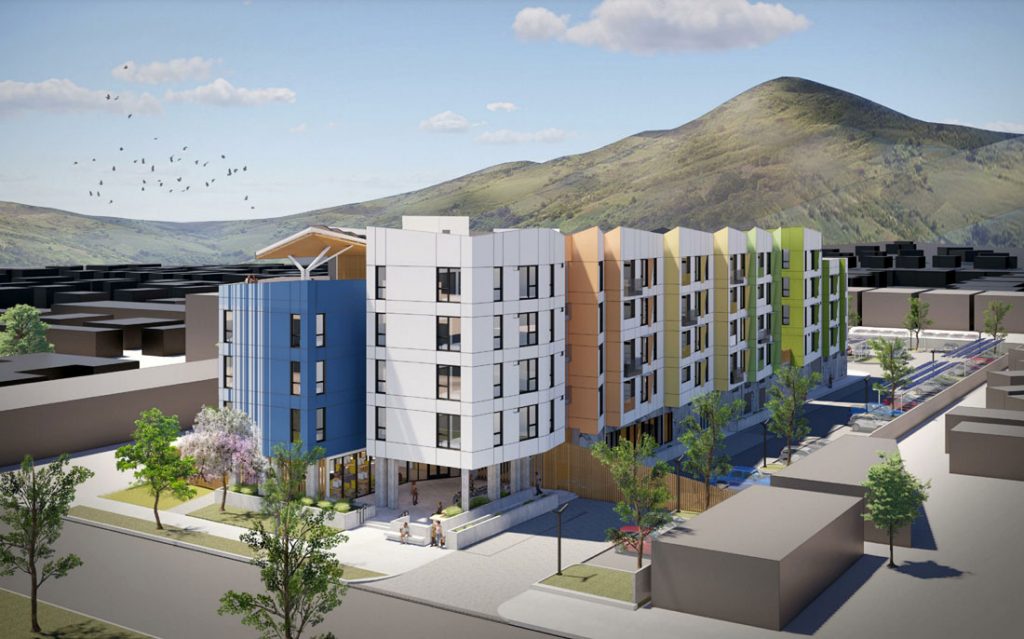
More than 300 new affordable apartments are coming to Morgan Hill, as the developers of two projects are seeking zoning and density exemptions under state laws that are designed to address California’s housing crisis.
The city council at its April 21 meeting will likely approve the exemptions and concessions—which include increased building heights and 80 percent more housing density—for both projects. The developers have requested the exemptions under state housing laws—including one known as the “density bonus law”—that limit local authorities’ ability to enforce zoning and development ordinances when it comes to affordable housing projects.
The April 21 council agenda includes the requests for exemptions and an 80-percent density bonus on the consent agenda. Morgan Hill Development Services Director Jennifer Carman said the council is required by state law to give the “ministerial approvals” to the affordable housing requests.
The proposed 249-unit multi-family rental complex on a 7.5-acre site at the northeast corner of Monterey Road and Madrone Parkway would be the largest housing development that Morgan Hill has seen in recent years. The proposal by Jemcor Development Partners includes 246 units restricted to lower income residents, and three units for property managers, according to a Feb. 10 application letter from Jemcor to the city.
Proposed on a 1.5-acre property at 17965 Monterey Road just north of downtown Morgan Hill, The Magnolias project consists of 66 units of multi-family housing—all designated for lower income residents, according to the project application letter submitted by SERA Architects.
The Magnolias consists of a single structure that, at five stories, would be the tallest building in Morgan Hill, according to City Manager Christina Turner. The proposed building height is 68 feet—an exemption from the city zoning code’s permitted height of 45 feet.
“Under state law, the city has extremely limited authority to require changes to development standards or design elements—this includes height and parking,” Turner said in an email to the Times. “We have pushed hard in working diligently with developers to find a compromise between what they are entitled to under the law and what will ‘fit’ into the city.”
Jemcor and SERA submitted their project applications under the state law known as the Housing Crisis Act of 2019, or Senate Bill 330, which has significantly restricted local cities’ and counties’ authority to reject or limit affordable housing developments. SERA submitted its application letter on behalf of The Magnolias’ developer, First Community Housing.
Furthermore, the state’s density bonus law allows developers of 100 percent affordable projects—such as the proposed Magnolias and Monterey/Madrone—to increase the allowable housing density on the property by 80 percent.
Both Jemcor and SERA have applied for this density bonus for their Morgan Hill projects. For the Magnolias site, that would increase the maximum allowable units from about 36 under the city’s zoning code, to 66 with the density bonus, according to SERA’s application letter.
The density bonus law also allows 100 percent affordable housing projects certain exemptions to local development standards and design elements. For the Monterey/Madrone project, Jemcor has requested a reduction in required parking, pavement design standards, building height (38 feet proposed), floor area ratios and front setbacks along Taylor Avenue to the east of the site.
“The Applicant’s primary objective is to optimize the site’s ability to contribute quality new affordable housing stock to the City of Morgan Hill, the County of Santa Clara, and the State of California,” says Jemcor’s application letter. “The Applicant has worked with its architect and civil engineer to ensure a total unit count sufficient to make a meaningful contribution to the ongoing need for affordable housing, while also working to ensure that the project remains financially feasible with no requirement for subsidy funds from public agencies, including the City of Morgan Hill.”

For The Magnolias project, under the density bonus law First Community Housing has requested exemptions to the city’s standards for exterior treatment and materials, building colors, window design, tree replacement, building height and floor area ratio.
Units at The Magnolias will be restricted to households earning between 30 percent and 60 percent of the Area Median Income, SERA’s letter says. Units will consist of 16 studios, 16 one-bedroom, 17 two-bedroom and 17 three-bedroom units. Half the units are proposed for “permanent supportive housing and rapid rehousing” units, for which the county may provide rental subsidies and case management services.
“Positive vision of community also extends internally. The project is supportive housing for underserved family populations in the area,” says SERA’s application letter for The Magnolias. “This project fosters and strengthens community by promoting support and stewardship of our fellow humans. Many on-site amenities are provided to tenants to encourage social bonds and strong community and family ties.”
At the April 21 meeting, the council will be asked to approve the requested density bonuses and concessions for the Monterey/Madrone and Magnolias projects, Turner said.
SB 330 and other recent state laws—including a 2020 update to the density bonus law—were approved to address the state’s ongoing housing crisis in part by lifting local restrictions on affordable units. The enactment of SB 330 forced the City of Morgan Hill to suspend its decades-old, voter-approved growth control system which has set annual caps on new housing construction in the city limits. As of 2019, that cap was no more than 215 housing units per year.
Numerous affordable housing projects in Morgan Hill have taken advantage of the state’s density bonus law over the years, according to city staff. In January, The Crossings at Monterey project—located on a 7.64-acre site on Watsonville Road near Monterey Road—was granted exemptions for 73-unit multi-family affordable housing development. About half the proposed units are dedicated to farmworker housing.
The property is the former site of Royal Oaks Mushroom farm.
Exemptions approved by the council for The Crossings at Monterey include a reduction in required parking, increased building height and increased floor area ratio. The developer, A0702 Morgan Hill, L.P., expects to start construction by August.







